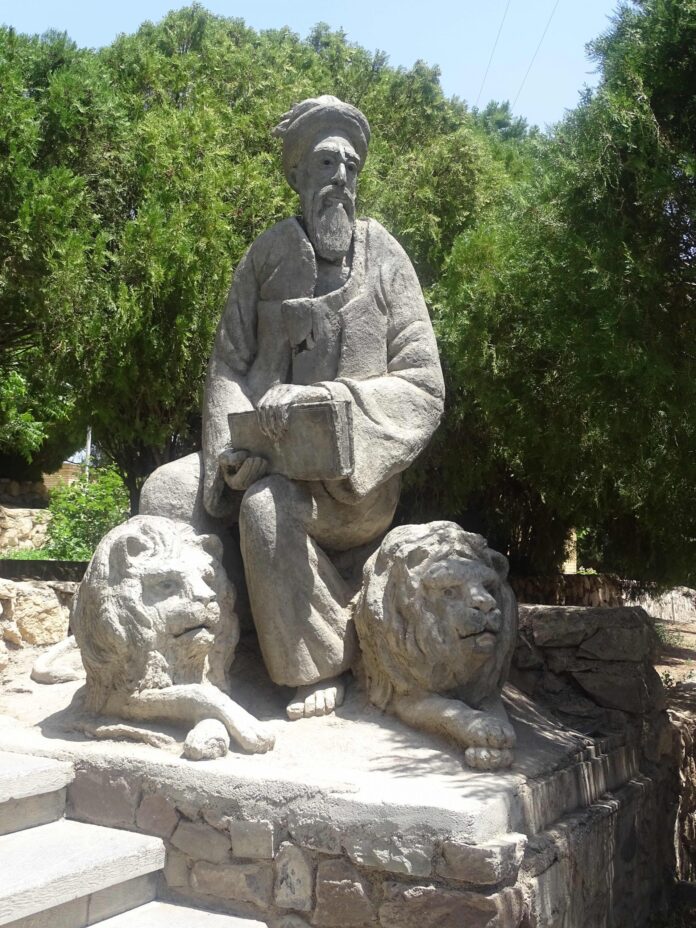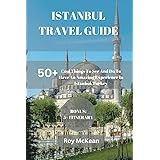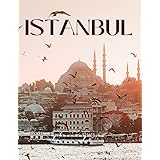Abu ‘l-Hassan Ali ibn Ahmad (or ibn Jaʻfar) ibn Salmān al-Kharaqāni is one of the master Sufis of Islam. He was born in 963 (352 Hijri year) in Khorasan in a village called Qaleh Now-e Kharaqan (today located in Semnan Province, Iran near Bastam) and died on the day of Ashura in 1033 (10th Muharram, 425 Hijri).
He was the disciple of Abul-Abbas Qassab Amoli but claimed a deep spiritual relation with Bayazid Bastami, a well-known Sufi Master who died almost a century before him but had spoken about the personality and state of Kharaqani. He was also influenced by Abul Hasan Hankari. His school of jurisprudence was Shafi‘i.
Attar of Nishapur, a famous Persian poet and Sufi, devoted a large part of his book Tadhkirat al-Awliya (Biography of the Saints) about the personality, state and stories of Kharaqani. Attar has him as Sultān-e Salātin-e Mashāyekh “King of kings of Sufi Masters”, “Ocean of the spiritual knowledge, “Sun of the Lord”, “Mystery of the Lord” and “Qibla of his people”.
Kharaqani was the Master of the famous Persian Sufi and poet, Abdullah Ansari. Avicenna, Mahmud of Ghazni, Abū-Sa’īd Abul-Khayr and Nasir Khusraw traveled to Kharaqan to meet him and expressed their deep admiring feelings and respect for him.
Rumi, Attar of Nishapur, Khwaja Abdullah Ansari, Jami and others have narrated many poems about Abu’l-Hasan and have reported his several stories. He was illiterate but had wide inspirational knowledge about the Quran and Hadith; his sayings and speeches are significantly magnificent due to their philosophical views.
The book Nūr al-ʿUlūm “Light of the Sciences” is dedicated to Abu’l-Hassan. It is believed to have been written by his murids after his death. A single manuscript copy is currently held in the British Museum.
……………………………………
Whoever comes to this dervish lodge, give their bread and do not ask about their religion or belief. Because the one who is worthy of carrying a soul to the lodge of the Great Allah
Of course, everyone deserves to eat bread at the table of Abu l Hasan. Harakani
“The rest of a believer’s members (at least) must be preoccupied with Almighty Allah. A believer must either remember Allah with his heart, or remember him with his tongue, or see something he wants to see with his eyes, or show generosity with his hand, either visit people with his feet or head (with his mind)
He should serve the believers, either pray with certainty, or try to reach marifah by contemplating with his mind, or do a sincere job, or warn people from the severity of the doomsday. I guarantee that such a person will go to heaven as soon as he raises his head from the grave.”
One day, Ibn Sînâ came to Harakan to visit Abu’l-Hasan-i Harakânî (k.s) at his home. His mistress scolded the visitor and said that she went to the forest. His wife, who did not believe in the greatness of Abu’l-Hasan, said inappropriate things to her about her husband. While Avicenna was going towards the forest, he saw that Ebü’l-Hasan-ı Harakânî was coming, loading wood on a lion.
“What is this?” when you ask,
He said, “Because I bear the burden of trouble by being patient with the troubles of the lion in my house, this lion also bears our burden.”
“One who is in love with the Creator cannot be satisfied by anything created.”
“People are three groups: One hurts even though it doesn’t hurt, the other hurts if you hurt it. Third, it doesn’t hurt even if you hurt it.”
“God put his fortune before the people. Everyone got their share, the fate of the gentry was sadness”
Neither you nor I know the secrets of Ezel.
Neither you nor I can solve this enigma.
Behind the curtain, there is someone who makes you talk to me.
If the curtain rises, neither you nor I will stay.
Abu’l Hasan Harakani
The feet of those who travel on earth and the hearts of those who travel in the sky collect water.
The state of the heart is that which has no bad temper. The best of deeds are those in which there is no idea of creation. The best of blessings are those that come with hard work and effort.
When your heart is sad, we know it as a booty, because people come to a place with the blessings of trouble. Abu’l Hasan harakani
“Everyone is worried about bringing something from here to there, they don’t know that only poverty is brought from here to there”.
“Not even the devil can exorcise the sedition caused by these two people: a scholar with worldly ambition and a sufi who lacks knowledge.”
“Hak Ta’ala gave me such an idea that I saw all of His creatures in him; I stayed in him; his preoccupation surrounded me day and night, the idea turned into foresight; arrogance turned into conversation; majesty and dignity turned into his unity with that idea. I understood and reached such a level that the idea turned into wisdom, turned into a straight path and compassion for the people; I have never seen anyone more compassionate towards his people than myself.’
‘If a thorn pierces someone’s finger from Turkistan to Damascus gate, that thorn is stuck in my finger; in the same way, if someone’s foot hits a stone from Turkistan to Damascus, his pain is my pain; If there is a sadness in a heart, that heart is my heart.’
“O Lord, you sent me pure and clean from your presence; I want to return to your presence as you sent me to the world. Grant this.”
“It is true, a person’s tongue should be one with his heart. The clutter of words is due to the desolation of the heart. The heart is the sea, the tongue is the shore; when the sea waves, it throws its contents to the shore.” | Abu’l Hasan al-Harakani
…………………………………..
Her kim bu dergaha
gelirse,
ekmeğini verin ve dinini
inancını sormayın.
Zira Ulu Allah ın
dergahına,
ruh taşımaya layık olan
Her kes elbette
Ebu l Hasan ın
sofrasında ,
ekmek yemeye de layıktır.
Harakani
“Mü’minin âzâlarından (en az) birinin devamı Yüce Allah ile meşgul olması gerekir. Bir mü’min Allah Teâlâ’yı ya kalbiyle hatırlamalı, ya diliyle zikretmeli, ya gözüyle O’nun görmek istediği bir şeyi görmeli, ya eliyle cömertlik yapmalı, ya ayağıyla insanları ziyaret etmeli, ya başıyla (aklıyla) mü’minlere hizmette bulunmalı, ya kesin bir inançla duâ etmeli, ya aklıyla tefekkür ederek mârifete ulaşmaya çalışmalı, ya ihlâslı bir iş yapmalı, ya da kıyâmetin çetinliğinden insanları îkâz etmelidir. Böyle birinin, kabirden başını kaldırır kaldırmaz kefenini sürüye sürüye cennete gideceğine ben kefilim”
Bir gün İbni Sînâ, Harakân’a, Ebü’l-Hasan-ı Harakânî (k.s) hazretlerini evinde ziyarete geldi. Hanımı, gelen misafiri azarlayarak, ormana gittiğini söyledi. Ebü’l-Hasan hazretlerinin büyüklüğüne inanmayan hanımı, kocası hakkında ona uygunsuz şeylerde söyledi. İbni Sînâ ormana doğru giderken Ebü’l-Hasan-ı Harakânî hazretlerinin, bir aslana odun yüklemiş vaziyette gelmekte olduğunu gördü.
“Bu ne haldir?” diye sorunca,
“Evimdeki aslanın sıkıntılarına sabredip bela yükünü taşıdığım için, bu aslan da bizim yükümüzü taşıyor” buyurdu.
“Yaratanın aşkına tutulan birisi yaratılmış hiçbir şey tarafından tatmin edilemez.”
“İnsanlar üç zümredir: Biri incitmediği halde incitir, diğeri incitirsen incitir. Üçüncüsü incitsen de incitmez.”
“Allah kısmetini halkın önüne koydu. Herkes kendi nasibini aldı, civanmertlerin nasibi hüzün oldu”
Ezel sırlarını ne sen bilirsin ne de ben
Bu muammayı ne sen çözersin ne de ben
Perdenin gerisinde seni beni bir konuşturan var.
Perde kalkarsa ne sen kalırsın ne de ben
Ebu’l Hasan Harakani
Yeryüzünde yolculuk edenin ayağı, gökte yolculuk yapanın ise kalbi su toplar.
Kalplerin halisi onda hiç kötü huy olmayandır. Amellerin en iyisi onda mahluk fikri bulunmayandır. Nimetlerin iyisi çalışıp çabalama ve gayret ile hasıl olandır.
Gönlünüz hüzünlenince bunu ganimet biliriz, zira insanlar, sıkıntının bereketiyle bir yere gelirler. Ebu’l Hasan harakani
“Herkes buradan oraya bir şey götürmek derdinde, bilmezler ki buradan oraya sadece yokluk götürülür”.
“Şu iki kişinin çıkardıkları fitneyi, şeytan bile çıkaramaz: Dünya hırsına sahip âlim ve ilimden yoksun sûfî.”
‘”Hak Teâlâ bana öyle bir fikir verdi ki, O’nun bütün mahlûkâtını onda gördüm; onda kalıp durdum; gece gündüz O’nun meşguliyeti beni sardı, fikir basirete dönüştü; küstahlık muhabbete dönüştü; heybet ve vakara dönüştü; o fikirle O’nun birliğini kavradım ve öyle bir mertebeye ulaştım ki, fikir hikmete dönüştü, dosdoğru yola ve halka şefkat haline dönüştü; O’nun halkına karşı kendimden daha şefkatlisini görmedim.’
‘Türkistan’dan Şam kapısına kadar birinin parmağına bir diken batarsa, o diken benim parmağıma batmıştır; aynı şekilde Türkistan’dan Şam’a kadar birinin ayağı taşa çarpsa, onun acısı benim açımdır; eğer bir kalpte bir hüzün olsa, o kalp benim kalbimdir.’
“Ya Rabbi, beni huzurundan saf ve tertemiz gönderdin; huzuruna, dünyaya gönderdiğin gibi dönmek istiyorum. Bunu nasib et.”
“Doğrudur, insanın dili kalbiyle bir olmalıdır. Sözün dağınıklığı, kalbin perişanlığındandır. Gönül denizdir, dil kıyı; deniz dalgalanınca içindekileri sahile atar.” | Ebu’l Hasan-el Harakâni






















